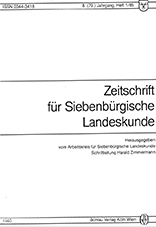

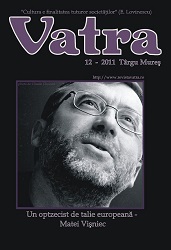
La momentul când s-a decis realizarea unui număr dedicat lui Matei Vişniec, cu concursul Danielei Magiaru, fără efortul şi implicarea căreia ar fi fost extrem de greu, dacă nu chiar imposibil, să închegăm un portret al dramaturgului jucat pe numeroase scene din toată lumea, încă nu ştiam cum se vor structura materialele şi sub ce lumină îl vor prezenta pe autor, doar cel al refl ectoarelor, sau îi vor surprinde şi celelalte domenii de creaţie, în arealul nostru cultural cunoscând-se foarte bine valenţele poetice ale lui Vişniec. După anunţarea temei, am avut surpriza să constatăm că tema îi preocupă şi pe alţii şi vor să se implice în realizarea unui număr cât mai consistent. Fără ştirea noastră, Ion Filipciuc a închegat şi el un dosar consistent centrat pe Vişniec, pe care ni l-a trimis în urmă cu puţină vreme. El a abordat din altă perspectivă creaţia lui Vişniec, ajutat de câţiva comentatori ai operei acestuia. În plus, Filipciuc ne pune la dispoziţie un interviu, un fragment de roman şi un grupaj de poeme. Puşi în faţa faptului, a trebuit să luăm o decizie, până la urmă cea mai echitabilă, credem noi. Astfel că am structurat numărul pe cele două dosare, operând totuşi o mică schimbare dictată de reguli redacţionale: am luat fragmentul de roman şi l-am transferat la rubrica epica magna, unde-i este locul. Cele două dosare se completează reciproc, în favoarea lui Vişniec. În afară de cei ce semnează sub genericul anunţat mai sus, într-un număr anterior (9-10/2011) am publicat un eseu al Ilenei Orlich (iniţial am intenţionat să-l păstrez pentru acest număr, însă l-am publicat mai devreme la rugămintea autoarei), iar acum, la cronică, Evelina Oprea se opreşte asupra noului volum de poeme al lui Vişniec, toate acestea întregind un portret veridic şi sugestiv în acelaşi timp al unuia dintre cei mai importanţi scriitori români de astăzi. Le mulţumim tuturor celor ce au contribuit la realizarea acestui număr deosebit de consistent (Kocsis Francisko).
More...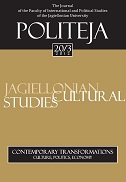
Keywords: Kantian politics; cosmopolitism; culture; values
The author offers in his article a philosophical and ethical concept of cosmopolitanism realized in the thought of Immanuel Kant. The text contains a theoretical study of cosmopolitanism derived from the postmodern critique of contemporary anthropology. According to the author, cosmopolitanism should be seen as one of the types, dimensions, or forms of globalization. It is a set of values, attitudes and identities, which are universal, apolitical, and transnational. The author traces the common basic source of this values, directing readers attention to culture.
More...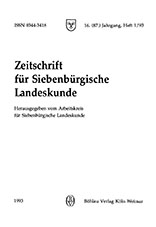
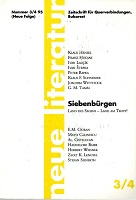
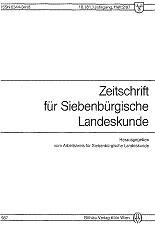
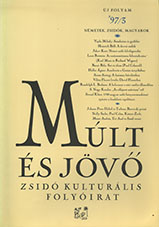
Anneliese Thudt - Zum Namen „Dracula“ Gerhardt Hochstrasser - Sind „Zolosim et Querali“ mit Salz und Kirieleis im Nösnerland identisch?
More...• „Lista Schindler” a culturii basarabene • Nicolae Leahu, poetul – cronică de Mircea V. Ciobanu • Dialog cu fifi nalul amânat: Leo Butnaru – Aureliu Busuioc • Versuri de Svetlana Corobceanu şi Vasile Iftime • Proză de Lucreţia Bârlădeanu şi Iulian Ciocan • Cătălin Dorian Florescu, un romancier al exilului • Praga literară. Scriitori cehi contemporani: Jaroslav Hašek şi Michal Viewegh Despre Herta Müller, memorie şi literatură – interviu cu dna Beate Köhler, director al Institutului Goethe din Bucureş
More...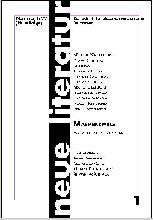
Keywords: interview; Gerhardt Csejka; Synthesis-Group
Describing interesting movements in the literary life of communist Bulagaria and the indirect impact of Western literature and philosophy on Bulgarian authors.
More...
Keywords: postmodernism; transition and postmodernism; ars poetica;
Interview with Georgi Gospodinov about the "cheerful end of a regularized literary tradition", the effect of freedom upon language and discourse, upon the attitude towards art. Short review of the literary situation in Bulgaria in the last three decades.
More...Summary of Vol. 28/2005, No. 1, contains as well the adresses of the authors and other useful information
More...The industrial revolution that took place at the end of the 19th century changed America in remarkable ways. People left rural homes for opportunities in urban cities. With the development of new machinery and equipment, the U.S. economy became more focused on factory production; Americans did not have to chiefly rely on farming and agriculture to support their families. At the same time, immigrants from all over the world crowded into tenements to take advantage of new urban opportunities. In the end, the sweeping economic, social and political changes that took place in post-war life allowed American Realism to prevail. The writing during this period was also very regional. The industrial revolution called for standardization, mass production of goods and streamlined channels of distribution. America was leaping into a new modern age and people feared that local folkways and traditions would be soon forgotten. Responding to these sentiments, realistic writers set their stories in specific American regions, rushing to capture the “local colour” before it was lost. They drew upon the sometimes grim realities of everyday life, showing the breakdown of traditional values and the growing plight of the new urban poor. American realities built their plots and characters around people’s ordinary, everyday lives. Additionally, their works contained regional dialects and extensive dialogue which connected well with the public.
More...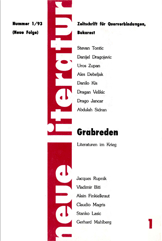
Gerhard Mahlberg about: Karl-Markus Gauß (ed.): Das Buch der Ränder, Wieser-Verlag, Klagenfurt, 1992 Gerhardt Csejka about: Dragica Rajčić, Lebendigkeit Ihre zurück. Gedichte, es. by Verena Stettler, eco-Verlag, Zürich, 1992
More...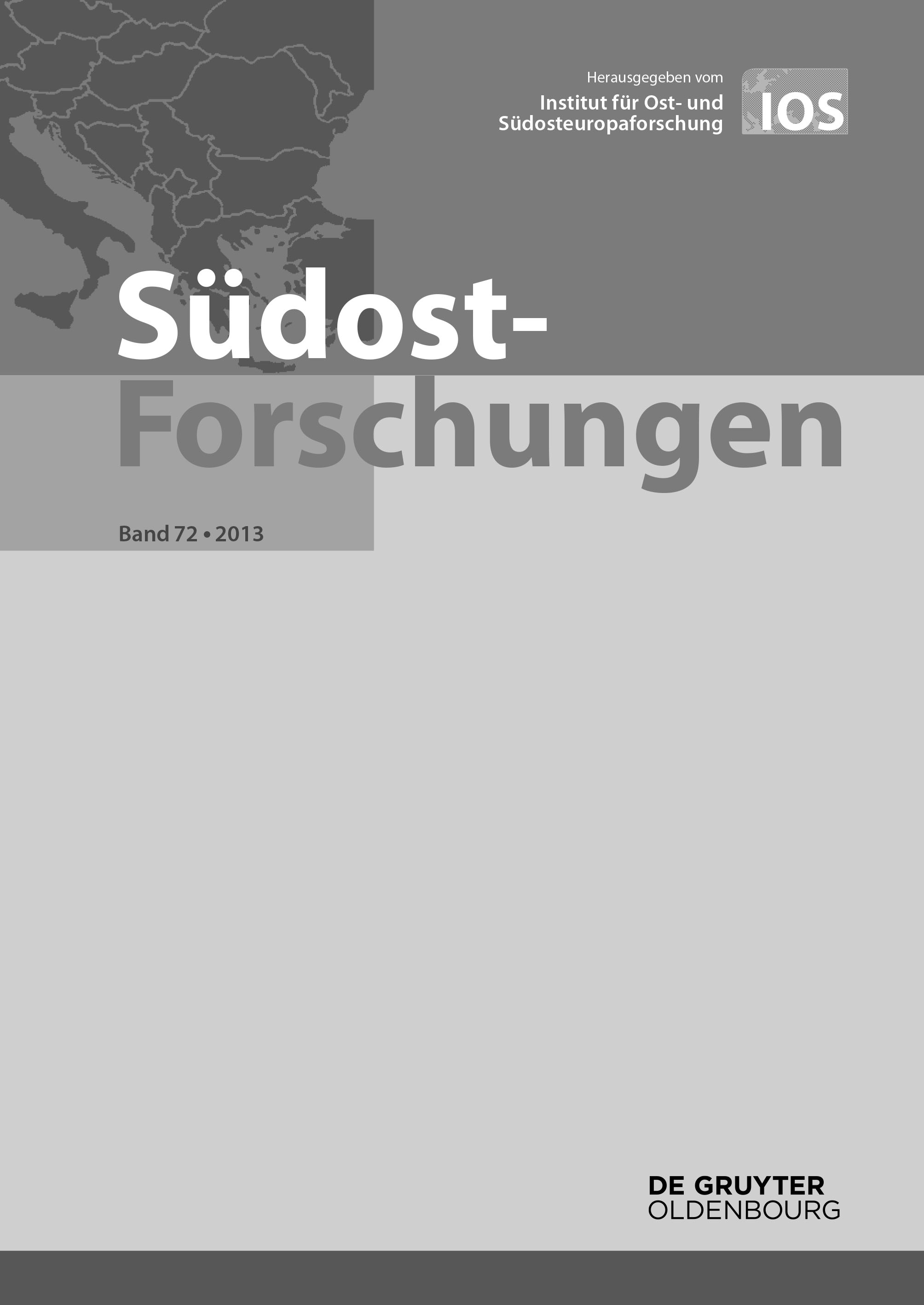
Roderick Beaton, Byron’s War. Romantic Rebellion, Greek Revolution. Cambridge: Cambridge University Press 2013. 338 S., 14 Abb., 2 Karten, ISBN 978-1-107-03308-5, Ł 30,– Hans Bergel, Von Palmen, Wusten und Basaren. Reisenotizen aus Israel. Berlin: Frank & Timme Verlag 2013. 86 S., ISBN 978-3-86813-019-5, € 14,80 Nicolae Gheorghiță, Byzantine Chant between Constantinople and the Danubian Principalities. Studies in Byzantine Musicology. Bucharest: Editura Sophia 2010. VIII, 256 S., zahlr. Abb., Musiknoten, ISBN 978-973-136-227-4 Aleksandra Gojkov-Rajić, Nemačka drama na vršačkoj sceni [Das deutsche Drama auf der Werschetzer Bühne]. Vršac: Visoka Škola strukovnih studija za obrazovanje vaspitača „Mihajlo Palov“ 2013 (Biblioteka Istraživačke studije, 61). 359 S., ISBN 978-86-7372- 177-4 Hayal perdesinde ulus, değișim ve geleneğin icadı [Stellen Sie sich die Nation als Höhepunkt, als Veränderung und Erfindung der Tradition vor]. Hg. Peri Efe. Istanbul: Tarih Vakfi Yurt Yayınları 2013. XII, 246 S., zahlr. Abb., ISBN 978-975-333-291-0, TRY 28,– Laura Manea, Literarische Gruppierungen und ihre Funktion in der rumaniendeutschen Literatur nach 1945. Hamburg: Verlag Dr. Kovač 2012 (Studien zur Germanistik, 45). 297 S., ISBN 978-3-8300-6495-4, € 85,80 O κόσμος του Ερωτόκριτου και ο Ερωτόκριτος στον κόσμο. Πρακτικά Διεθνούς Επιστημονικού συνεδρίου Σητεία, 31/7-2/8/2009 [Die Welt des „Erotokritos“ und „Erotokritos“ in der Welt. Akten des internationalen wissenschaftlichen Kongresses, Siteia, 31.7.-2.8.2009]. Hg. Tasula M. Markomichelaki. Heraklion: Elliniko Kentro 2012. 208 S., ISBN 978- 960-86153-4-2, € 29,80 Zuanne Papadopulos, Στον καιρό της σχόλης (L’Occio). Αναμνήσεις από την Κρήτη του 17ου αιώνα [In der Freizeit (L’Occio). Erinnerungen an das Kreta des 17. Jahrhunderts]. Einl. u. Komm. Alfred Vincent. Übers. u. Edition Natalia Deligiannaki. Heraklion: Crete University Press 2012. 331 S., 18 Abb., ISBN 978-960-524-390-6, € 20,– Κρητικά Χρονικά [Cretica Chronica]. Bd. 31. Heraklion: Society of Cretan Historical Studies 2011. 321 S., zahlr. Abb., ISSN 0454-5206, € 15,– Ottoman Empire and European Theatre. Volume I: The Age of Mozart and Selim III (1756-1808). Hgg. Michael Hüttler / Hans Ernst Weidinger. Wien: Hollitzer Wissenschaftsverlag 2013 (Don Juan Archiv Wien: Ottomania, 1). 1016 S., 134 teils farb. Abb., Musiknoten, ISBN 978-3-99012-065-1, € 82,50 Walter Puchner, Hellenophones Theater im Osmanischen Reich (1600-1923). Zur Geschichte und Geographie einer geduldeten Tatigkeit. Wien, Berlin, Münster: LITVerlag 2012. VIII, 235 S., ISBN 978-3-643-50447-0, € 24,90 Das rumanische Theater nach 1989. Seine Beziehungen zum deutschsprachigen Raum. Hgg. Alina Mazilu / Medena Weident / Irina Wolf. Berlin: Frank & Timme Verlag 2011 (Forum: Rumänien, 8). 441 S., 26 sw. Abb., ISBN 978-3-86596-290-4, € 39,80 Loukia Step hou, Die neugriechische Metaphrase von Stephanites und Ichnelates durch Theodosios Zygomalas. Madrid: Consejo Superior de Investigaciones Cientificas 2011 (Nueva Roma. Bibliotheca Graeca et Latina Aevi Posterioris, 35). XXV, 330 S., 11 Abb., ISBN 978-84-00-09402-7, € 35,– Manolēs G. Barb unēs, Λαογραφικές παραστηρήσεις στο έργο „Τα κατά Στεφανίτην και Ιχνηλάτην“ [Volkskundliche Anmerkungen zu „Stephanites und Ichnelates“]. Xanthi: Spanidis 2012. 94 S., 6 Abb., ISBN 978-960-6653-59-9, € 15,98
More...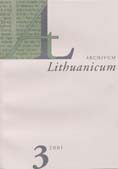
Keywords: Bible; Lithuanian religious hymns; Translation; 18th century;
In the first part of the hitherto unpublished manuscript Nahû, Suilês ir Banycês Pamôkµlas, written in 1729 by Fabian Ulrich Glaser (1688-1747), the Lithuanian translation of the Book of Proverbs 30,7-9, can be found on pp. 210-211, which is different from the version of the first Lithuanian Bible translation of 1735. The 1740 edition of Glasers hymnbook Kélos Nobanos Gieµmes contains as No.2 the hymn Dwdjû aß Dåiktû praßau, translated from the German ¨weyerley bitt ich von dir by Paul Gerhardt (1607-1676) and included in the East Prussian hymn-books since 1675. This text should not be confused with the hymn ¨wey Ding, o Herr, bitt ich von dir, first published in 1582 and printed in East Prussian hymn-books since 1650. The Lithuanian translation Dwieiû Daiktû Diewe praßau appeared in Daniel Kleins hymnbook in 1666. A different translation from the same German original, DWieiu dÀyktu tÀw Pone/ PrÀßau duokim mÀno µtone appeared in 1653 in the Kniga Noba¸niµtes.
More...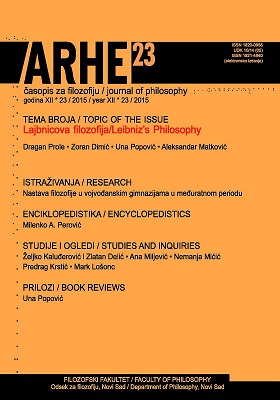
Keywords: Leibniz; Lisbon earthquake; science; mathematics; magnitude; prediction; optimism;
One of the most important founders of the modern notion of science was Gottfried Wilhelm Leibniz. By his own determination of modern science, his name and his philosophy are linked in many ways to the famous catastrophe at the start of the modern epoch in Europe, namely the 1755 Lisbon earthquake. Leibniz’s ideal of science was expressed through the idea of mathesis universalis (universal mathematics). According to Leibniz’s interpretation, all things in nature should be understood and explained through size (magnitudo), form (figure) and motion (motus). We could say that according to this idea of modern science particular natural phenomena always need to be explained mathematically. Leibniz’s idea of science is the complete expression of the modern era. The mathematics should not only provide science with certainty (certitude) but our lives as well. Leibniz’s mathematical interpretation of natural phenomena takes us in this way to ”optimism” and the idea of the best of all possible worlds. Unfortunately Leibniz’s optimistic view of the world, which was generally typical for the end of the 17th and the beginning of the 18th century, was later dramatically interrupted by Lisbon earthquake. The ability to measure and compute the strength of the earthquake and the height of the tsunami did not bring tranquility and serenity to the souls of Portuguese and other Europeans. On the contrary, the computing knowledge of the 1755 Lisbon earthquake incorporated into their lives the enormous fear of recurrent catastrophe. The past catastrophe was regarded as a portent of the new catastrophe to come. Hence the author of this paper argues that it is not the 1755 Lisbon earthquake itself which marked the end of the optimism, but the modern notion of the science which brought the fear into the souls of the people by counting and predicting the probability of the new catastrophes.
More...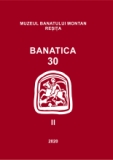
Keywords: Holocaust; Roma; Romania; society; racism;
The formation of the nation-states in the Central and South-East of the old continent following the dissolution of the Central Powers at the end of the First World War gave the opportunity to assert the collective identity expressed by a number of linguistic, cultural and ethnic groups. The Great Powers, true heterogeneous structures in linguistic and confessional terms, had tried unsuccessfully to create a supranational identity by eliminating or at best leveling the distinct elements of Germans, Czechs, Slovaks, Croats, Slovenes, Poles, Romanians, Finns, without of course forget about the Baltic peoples. Usually people react strongly, positively or negatively to what they perceive to be right differently. Too few times do they remain indifferent. One of the negative reactions is anxiety. The fear of otherness, of the different cultural, linguistic and religious fellow citizens of the majority group can be compensated by exploration and experimentation, by accepting and embracing the differences. The power of words and the power of thoughts are probably the greatest forces for people through the long-term impact they can have on individuals but also on communities. The purpose of Nazism was to exterminate all Jews in Europe. Gypsies and neo-Protestant sects were on the list. Under these conditions, the mere survival of the Jews was a form of resistance. In Romania, the resistance was relatively successful. A relatively large percentage of the Jewish and Gypsy community in Romania survived the Holocaust.
More...
Keywords: toleration; laïcité; secularism; Enlightenment; Pierre Bayle; John Locke; Voltaire; Declaration of the Rights of Man
This paper traces the history of the philosophical and political justification of religious tolerance from the late 17th century to modern times. In the Anglo-Saxon world, John Locke’s Letter Concerning Toleration (1689) gave birth to the doctrine of the separation of Church and State and to what is now called secularization. In France, Pierre Bayle refuted, in his Philosophical Commentary (1685), the justification of intolerance taken from Saint Augustine. Following him, Voltaire campaigned for tolerance following the Calas affair (1763), and the Declaration of the Rights of Man (1789) imposed religious freedom which, a century later, resulted in the uniquely French notion of laïcité, which denies religion any supremacy, and any right to organize life in its name. Equality before the law takes precedence over freedom: the fact of being a believer does not give rise to the right to special statutes or to exceptions to the law.
More...